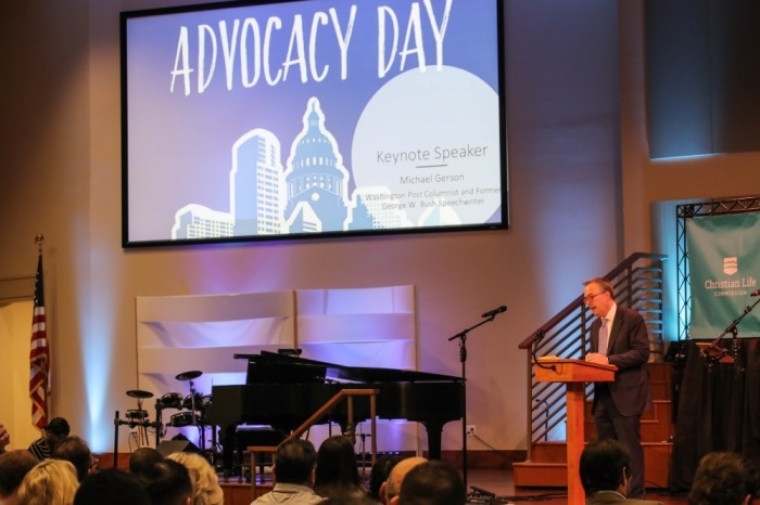Can Christians get political without hurting the Gospel message?

Christians involved in politics today face three difficult trends, Michael Gerson argued.
Polarization, confirmation bias, and dehumanization present challenges for all Americans, and Christians should counter, rather than contribute to these problems, Gerson, a conservative Washington Post columnist, said in the Tuesday keynote address for Advocacy Day, a Baptist General Convention of Texas conference to educate Christian Texans on involvement in politics.
Gerson began by telling the audience that political advocacy, while important, is not the most important type of advocacy for a Christian.
"The most profoundly positive and powerful form of advocacy is advocacy for the Gospel of Jesus Christ, and the gates of Hell shall not prevail against you," he said.
Polarization
"We live in a landslide country," Gerson explained, where most of us live in areas where either Republicans or Democrats easily win in landslide elections. In 2016, he noted, 80 percent of counties voted for either Trump or Clinton in a landslide. In the 1970s, that number was 25 percent for presidential elections.
This leads to many of us living in a bubble, where we interact little with people who vote differently.
"We live increasingly in homogenous political communities, in silos of the mind," he said.
Gerson pointed to a 2016 report by Pew Research Center.
In describing one of the findings of the report, Gerson quoted former Pew Vice President Paul Taylor, who wrote: "These days Democrats and Republicans no longer stop at disagreeing with each other's ideas. Many in each party now deny the other's facts, disapprove of each other's lifestyles, avoid each other's neighborhoods, impugn each other's motives, doubt each other's patriotism, can't stomach each other's news sources, and bring different value systems to such core social institutions as religion, marriage and parenthood. It's as if they belong not to rival parties but alien tribes."
To resist this polarization, Gerson said, Christians "must start with an adjustment of attitude" by loving those on both sides of our polarized life.
This means Christians need to learn how to be doorkeepers and "to live on the edge of the inside," Gerson said, quoting Franciscan author Richard Rohr.
Rohr wrote: "To live on the edge of the inside is different than being an insider, a 'company man,' or a dues paying member. Yes, you have learned the rules and you understand and honor the system as far as it goes, but you do not need to protect it, defend it, or promote it. ... A doorkeeper must love both the inside and the outside of his or her group, and know how to move between these two loves."
Confirmation bias
One of the most "unsettling" findings in political science, Gerson continued, is "the more knowledge that political partisans have, the more stubborn they become in their ideological beliefs."
Those with little political knowledge aren't the biggest problem in American politics, Gerson contended, "it's people who use their brainpower to support the views of their tribe."
Read more from "Can Christians get political without hurting the Gospel message?" on The Christian Post.